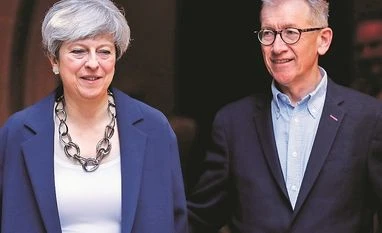But with May’s personal authority in tatters, there were reports that moves were afoot within her Conservative Party to dislodge her, while opposition Labour leader Jeremy Corbyn was insisting she could be ousted and he could replace her.
May’s Downing Street office said on Sunday she had spoken with Northern Ireland’s pro-Brexit, socially conservative Democratic Unionist Party (DUP) to discuss finalising a deal when parliament returns on Tuesday.
“We will welcome any such deal being agreed, as it will provide the stability and certainty the whole country requires as we embark on Brexit and beyond,” Downing Street said in a statement.
“As and when details are finalised both parties will put them forward,” it said.
The timing is challenging, with Britain due to start negotiating the terms of its exit from the European Union with the bloc’s 27 other members on June 19.
The Conservatives won 318 House of Commons seats in Thursday’s election, eight short of an outright majority. Labour, the main opposition party, won 262. The DUP won 10.
Labour’s Corbyn told the Sunday Mirror newspaper he saw a route to power himself, although it was not clear how he would command the support of a majority of members of parliament.
Labour’s tally, even when added to those of potential allies such as the Scottish National Party and other smaller parties, was still short of a majority.
“I can still be prime minister. This is still on. Absolutely,” Corbyn was quoted as saying.
He said his party would seek to vote down May’s Queen’s Speech, or programme for government, when she presented it to parliament. If that succeeded, May would be expected to stand aside and let Corbyn try to win the backing of a majority of members of parliament to form a government.
May had called the snap election with a view to increasing the narrow majority she had inherited from her predecessor David Cameron.
At the start of the campaign, she was enjoying poll leads of 20 points or more over the main opposition Labour Party.
But after a poor campaign and an unexpectedly stiff challenge from Labour, her plan went disastrously wrong, leaving her unable to form a sustainable government without DUP support.
“I don’t think Theresa May and this government have any credibility. The prime minister called this election on the basis she would need a stronger mandate to negotiate Brexit. Well, look what’s happened,” Corbyn told the Sunday Mirror.
The Conservatives now plan to reach a so-called confidence and supply agreement with the DUP, which would involve it supporting a Conservative minority government on key votes in parliament but not forming a formal coalition.
After an initial round of discussions, Downing Street had said on Saturday that the “principles of an outline agreement” had been agreed with the DUP.
To read the full story, Subscribe Now at just Rs 249 a month
Already a subscriber? Log in
Subscribe To BS Premium
₹249
Renews automatically
₹1699₹1999
Opt for auto renewal and save Rs. 300 Renews automatically
₹1999
What you get on BS Premium?
-
Unlock 30+ premium stories daily hand-picked by our editors, across devices on browser and app.
-
Pick your 5 favourite companies, get a daily email with all news updates on them.
Full access to our intuitive epaper - clip, save, share articles from any device; newspaper archives from 2006.
Preferential invites to Business Standard events.
Curated newsletters on markets, personal finance, policy & politics, start-ups, technology, and more.
Need More Information - write to us at assist@bsmail.in
)